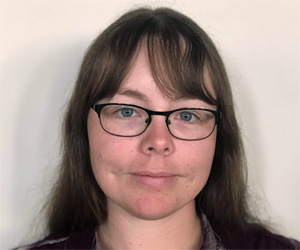This article is part of our series profiling the Class of 2018 ‚ÄĒ the grads of Dal's 200th year. Click here for more profiles, and learn more about Dal Convocation at the Convocation website.
A foray into the gaming industry as a graphic artist at a Lunenburg-based studio kicked off Ontario-native Johna Latouf’s East Coast experience.
‚ÄúMy background is in gaming,‚ÄĚ says Johna. ‚ÄúI was interested in expanding my knowledge into something more science related and so applied for the Bachelor of Computer Science at Ľ∆…ę÷Ī≤•.‚ÄĚ
Johna won’t have to travel far when she graduates this October as she has is continuing with her studies in the Master of Computer Science program.
Discovering her passion
It was taking an honours option combined with experience working with the that sparked Johna’s interest in research.
 ‚ÄúI chose the honours option and I had also done directed studies,‚ÄĚ she explains. ‚ÄúMy project focused on designing an application for virtual reality for drawing voxel models. This was a great way for me to try research out as part of my undergraduate studies, learn how theses are written, and how research projects work.
‚ÄúI chose the honours option and I had also done directed studies,‚ÄĚ she explains. ‚ÄúMy project focused on designing an application for virtual reality for drawing voxel models. This was a great way for me to try research out as part of my undergraduate studies, learn how theses are written, and how research projects work.
‚ÄúI would advise other students to give research a try during their undergraduate studies, even if they plan to get a job rather than move on to graduate studies ‚ÄĒ it‚Äôs a great foundation for the future and you can always come back to it later.‚ÄĚ
Technology to support sustainable fishing activity
In her third year, Johna started working part-time for the Institute for Big Data Analytics in web development. This soon turned into a series of co-op work terms and an introduction to ocean data research.
Working as a research assistant to a postdoc within the institute, Johna supported the development of a web application to interactively display fishing activity across the globe.
‚ÄúUsing Automatic Information System (AIS) vessel tracking data from a company called exactEarth, my post-doc student supervisor Erico Neves de Souza developed an algorithm to determine if ships currently in the ocean are fishing or not,‚ÄĚ says Johna.
‚ÄúThis helps us to see where fishing is taking place, where vessels come from, how they move and how much fishing is happening worldwide. The application can be used by groups and professionals including conservationists and biologists to contribute towards sustainable fishing activity.‚ÄĚ
Making ocean data useful
Johna’s work with ocean data doesn’t end there: she is currently working as a software engineer with the Marine Environment Research Infrastructure for Data Integration and Application Network (MERIDIAN) initiative alongside her graduate studies. Based out of the Institute for Big Data Analytics, MERIDIAN is an initiative to build a distributed data centre and a hub of expertise devoted to ocean data, with a focus on ocean acoustics.
‚ÄúOcean related research is huge, and I‚Äôm particularly interested in conservation, so it works out as a good fit for me,‚ÄĚ says Johna. ‚ÄúIt‚Äôs an interesting but challenging area of research as there is so much data. It‚Äôs a challenge to make all of this data useful for scientists.‚ÄĚ
The work Johna is involved with as part of MERIDIAN and the Institute for Big Data Analytics is supporting the increasing volume of ocean data research taking place in the Faculty of Computer Science. This emphasis was significantly bolstered with the recent launch of , the world-class big ocean data innovation environment tackling real-world, commercially-focused ocean data challenges.
‚ÄúI‚Äôm currently working with my master‚Äôs co-supervisors Dr. Stan Matwin and Dr. Fernando Paulovich on my thesis topic but it‚Äôs likely to be ocean data related,‚ÄĚ Johna says. ‚ÄúMERIDIAN is still in the early stages and I‚Äôd like to remain involved with them but after that who knows!‚ÄĚ

